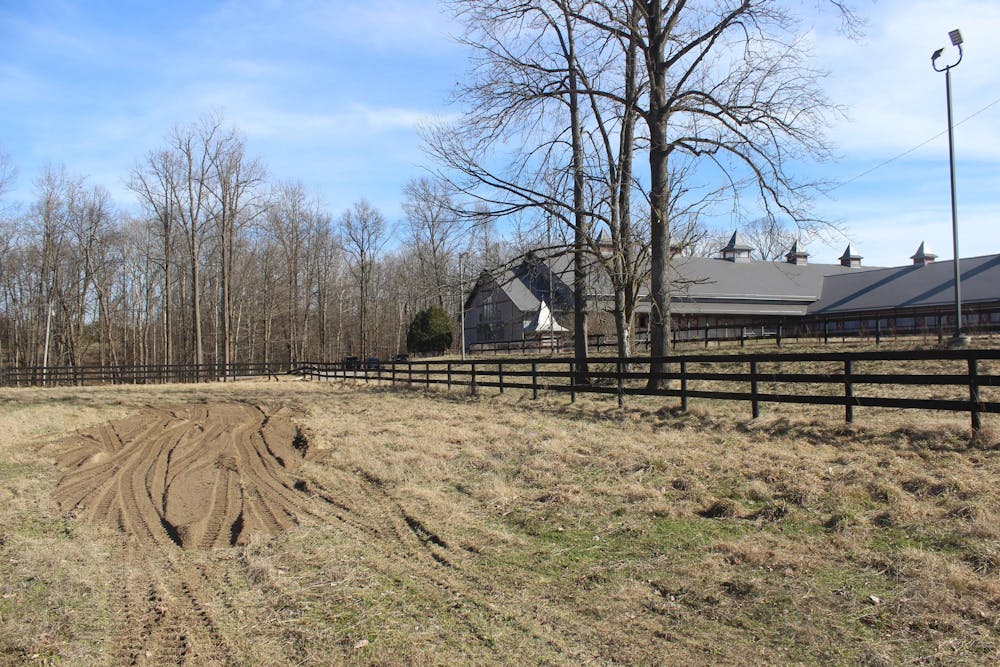After sitting vacant for two years, the 26,000-plus square foot barn and a property just shy of nine acres fell into the hands of Brandi Williams in July 2023. Once home to a Bloomington equestrian center, she had a vision for the property to transform into Solidago Acres, a home for farm-to-table food access and gathering for the Bloomington community.
Williams has worked in the food industry for several years. She both owns and operates her gluten-free bakery “Primally Inspired Eats,” did past work to procure food from local farms for distribution in areas with extreme food insecurity and administered grants for proposals related to issues in food and agriculture. She developed relationships with local farmers, and once she began farm-to-table style catering with PIE, she was ready to expand. Williams said she was looking for a space to bring all her interests together and position the community at the heart of the operation.
Williams had kept this vision in the back of her mind for quite some time before a friend told her to consider the property that Crimson Acres operated from 2015 until 2021. It was zoned for commercial, agricultural and residential use and met all the needs for her vision. After receiving a direct farm loan from the United States Department of Agriculture Farm Service Agency, Williams had the resources needed to purchase the space.
Working with fellow “growers,” including her friends Samandar Ghaus and AB Scherschel, the three built Solidago Acres.
A large part of the Solidago Acres vision is what they plan to grow, and the growing season has already begun. They plan to seed anything from tomatoes and cucumbers to medicinal herbs and mushrooms to various breeds of flowers.
“It is our first season, so it’ll be interesting,” Williams said. “We’re still getting to know the land and that’s an important part of it, feeling it out. What is there? What’s in the soil? What are the nutrients in the soil to make sure we’re creating a strong foundation to grow nutrient-dense food and not just throwing anything out there?”
Williams said they are also working on attaining nonprofit status for two projects — Flowers for the People and Cooking for a Cause — under Solidago Acres, which will make use of the harvest the farm cultivates.
Flowers for the People, which will be operated by Ghaus, plans to curate bouquets from the flowers grown on Solidago Acres to take to families in transitional housing in the Bloomington area.
With Cooking for a Cause, Solidago Acres hopes to make an experience available to the community where they can partake in the process of a farm-to-table meal, while helping those experiencing food insecurity. Participants will enjoy what they prepared on the property while also packing portions to send to organizations like Middle Way House, an agency which provides emergency shelter and services to victims of sexual violence, domestic violence and human trafficking.
“With my work before, sourcing and getting food to people who are experiencing food insecurity, we realize that yes, people need fresh local produce,” Williams said. “But when we get to the underpinnings of that, we realize they have to have the resources to be able to create a meal from that fresh local produce or that local meat source. Having a farm-to-table prepared meal that is nutrient dense and already ready to go, then that’s a game changer.”
With the experiences Solidago Acres plans to offer, she hopes it will start conversations among the community about where the food came from and how Bloomington residents can better provide nutritious food for all residents.
Ghaus said Solidago Acres considers everyone in the local community, including unhoused neighbor, people in low-income housing, immigrants lacking permanent legal status and trans people.
"Those are people who are local to us also," Ghaus said. "When we’re gathering to figure out how to make an equal food economy that is sustainable for queer, trans, Black and brown farmers, we’re going to consider what we mean by local and what we mean by community.”
What was once a small outdoor riding arena has already been renovated into a space to hold six glamping tents. Glamping is a type of camping where guests are still immersed in nature, without sacrificing the luxuries of things like bed sheets and running water. The spaces are available to book for the upcoming solar eclipse April 8. Williams said guests will have the amenities of on-site parking, accessible bathrooms and a locally sourced breakfast. The farm hopes to have them available to book for other large events in Bloomington like graduation and is considering the possibility of opening spaces for regular weekends in the future.
The largest facility on the farm is the barn, equipped with 40 equestrian stalls, an indoor arena and a large loft once used to store bales of hay. Solidago Acres renovated five stalls to board horses and has plans to transform the rest into an area for a market, artisan workspace stalls for tenants to rent, and the potential for living quarters. They plan to use the loft as a community gathering space.
Williams said the barn has more than enough space to accommodate the horses’ needs, which allows them to be creative with what they use the space for. She said that's the “dreamy” part.
The commercial kitchen is already under construction in part of what was the indoor arena. It will have a service window to the outside patio, which will be used for various events including the ticketed farm-to-table dinners and as a venue space to book for gatherings such as weddings.
Although the entire Solidago Acres project has only just begun, Williams is happy with the construction and set-up process and is excited for the property’s future.
“It’s much more than a farm,” Williams said. “It’s much more than boarding horses and farm-to-table dinners. It’s feeding people nutritionally and hopefully feeding hearts and sharing experiences so the community can connect, so that we can better support each other.”
CLARIFICATION: A paragraph has been edited to adhere to AP style guidelines.




